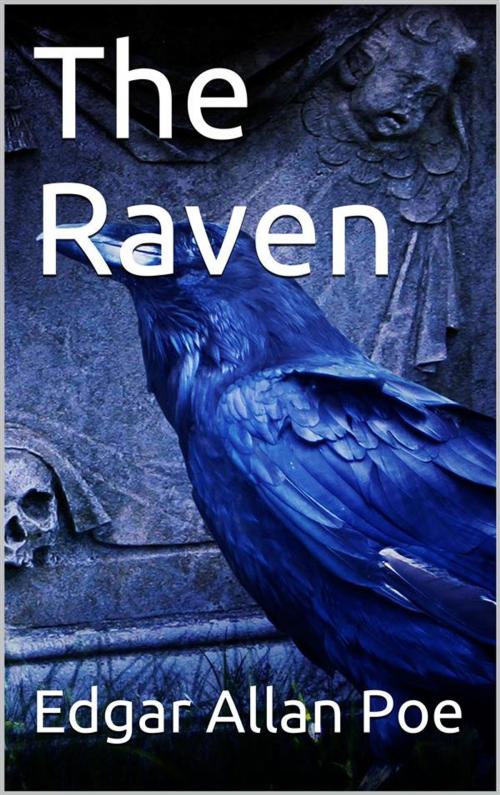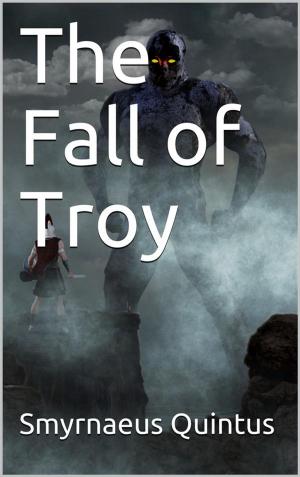| Author: | Edgar Allan Poe | ISBN: | 9788832542325 |
| Publisher: | iOnlineShopping.com | Publication: | March 17, 2019 |
| Imprint: | Language: | English |
| Author: | Edgar Allan Poe |
| ISBN: | 9788832542325 |
| Publisher: | iOnlineShopping.com |
| Publication: | March 17, 2019 |
| Imprint: | |
| Language: | English |
"The Raven" is a narrative poem by American writer Edgar Allan Poe. First published in January 1845, the poem is often noted for its musicality, stylized language, and supernatural atmosphere. It tells of a talking raven's mysterious visit to a distraught lover, tracing the man's slow fall into madness. The lover, often identified as being a student, is lamenting the loss of his love, Lenore. Sitting on a bust of Pallas, the raven seems to further distress the protagonist with its constant repetition of the word "Nevermore". The poem makes use of folk, mythological, religious, and classical references.
"The Raven" was first attributed to Poe in print in the New York Evening Mirror on January 29, 1845. Its publication made Poe popular in his lifetime, although it did not bring him much financial success. The poem was soon reprinted, parodied, and illustrated. Critical opinion is divided as to the poem's literary status, but it nevertheless remains one of the most famous poems ever written.
"The Raven" follows an unnamed narrator on a dreary night in December who sits reading "forgotten lore" by a dying fire as a way to forget the death of his beloved Lenore. A "tapping at [his] chamber door" reveals nothing, but excites his soul to "burning". The tapping is repeated, slightly louder, and he realizes it is coming from his window. When he goes to investigate, a raven flutters into his chamber. Paying no attention to the man, the raven perches on a bust of Pallas above the door.
Amused by the raven's comically serious disposition, the man asks that the bird tell him its name. The raven's only answer is "Nevermore". The narrator is surprised that the raven can talk, though at this point it has said nothing further. The narrator remarks to himself that his "friend" the raven will soon fly out of his life, just as "other friends have flown before" along with his previous hopes. As if answering, the raven responds again with "Nevermore". The narrator reasons that the bird learned the word "Nevermore" from some "unhappy master" and that it is the only word it knows.
"The Raven" is a narrative poem by American writer Edgar Allan Poe. First published in January 1845, the poem is often noted for its musicality, stylized language, and supernatural atmosphere. It tells of a talking raven's mysterious visit to a distraught lover, tracing the man's slow fall into madness. The lover, often identified as being a student, is lamenting the loss of his love, Lenore. Sitting on a bust of Pallas, the raven seems to further distress the protagonist with its constant repetition of the word "Nevermore". The poem makes use of folk, mythological, religious, and classical references.
"The Raven" was first attributed to Poe in print in the New York Evening Mirror on January 29, 1845. Its publication made Poe popular in his lifetime, although it did not bring him much financial success. The poem was soon reprinted, parodied, and illustrated. Critical opinion is divided as to the poem's literary status, but it nevertheless remains one of the most famous poems ever written.
"The Raven" follows an unnamed narrator on a dreary night in December who sits reading "forgotten lore" by a dying fire as a way to forget the death of his beloved Lenore. A "tapping at [his] chamber door" reveals nothing, but excites his soul to "burning". The tapping is repeated, slightly louder, and he realizes it is coming from his window. When he goes to investigate, a raven flutters into his chamber. Paying no attention to the man, the raven perches on a bust of Pallas above the door.
Amused by the raven's comically serious disposition, the man asks that the bird tell him its name. The raven's only answer is "Nevermore". The narrator is surprised that the raven can talk, though at this point it has said nothing further. The narrator remarks to himself that his "friend" the raven will soon fly out of his life, just as "other friends have flown before" along with his previous hopes. As if answering, the raven responds again with "Nevermore". The narrator reasons that the bird learned the word "Nevermore" from some "unhappy master" and that it is the only word it knows.















